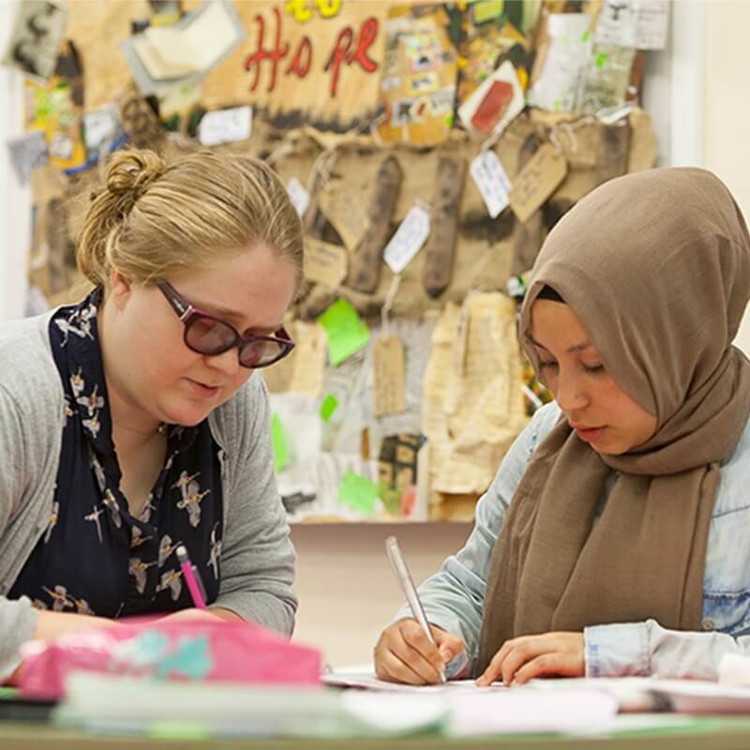Duration:
4 to 6 years (1 year full-time and 3 to 5 years part-time)
Number of credits: 540
Stage 1: 180 credits of taught modules at level 7.
Stage 2: 360 credits from portfolio at level 8.
Complete this taught doctorate and achieve an internationally recognised doctoral degree. Three of your existing works, such as projects, published papers, professional reports, conference presentations or other significant outputs, can contribute to your portfolio.
Did you know
This structured and integrated programme is aimed towards working professionals in the field of Education.
All modules from group A must be taken and passed: This is an indicative list of modules; a selection will be offered each term.
- Philosophy of Social Science Research
- Introduction to Research Design
- Qualitative Research Approaches
- Quantitative Research Approaches
- General Research Skills
- Social Theory and Research
- Dissertation
- Doctoral portfolio, consisting of at least three pieces of work, plus a scholarly commentary you will develop with support from expert supervisors

Our curriculum
Gain academic recognition for your existing research within the field of education.
You will undertake your first year of study remotely, completing your first 180 credits at Level 7. You will then go on to complete your remaining 360 credits at Level 8 part-time through remote study. Your final academic year, which includes your doctoral viva, must be at Roehampton.
A key feature of this programme is that it offers the opportunity for you to draw on your existing professional work for your portfolio, such as projects, published papers, professional reports and conference presentations. These existing works will be assessed as part of your application.
The PhD (Portfolio) is ideal for experienced professionals with substantial existing work to compile into a portfolio. This route allows you to gain recognition for your contribution to your professional field without the need to start a completely new research project.
It offers students a viable and flexible pathway to achieving a doctoral degree that can make an important contribution to professional practice.

Learning
Complete a structured, integrated programme of study to achieve your PhD.
In Stage 1 of the course, you will study online and be part of our diverse, supportive and intellectually challenging research environment. The advanced module choices available to you will allow you to develop your expertise and research capabilities within your field.
Stage 2 of the programme is delivered primarily online. Peer reviews, active online group discussions, as well as contact with your research supervisor will support you throughout the development of your portfolio. You will develop significant project management skills through the development of your 55,000 to 60,000 word thesis, plus the oral assessment.
A crucial component of the PhD (Portfolio) is its reflective, critical, commentary that synthesizes your three portfolio pieces into a single piece of integrated work. Whilst all material within the thesis must be written in English, the portfolio can draw on existing work in your own language and guidance on translation services will be provided. As with all doctoral work, the portfolio must demonstrate an original contribution to knowledge.
For international (and in some cases non-English speaking students) this can showcase innovative work relevant to your local context, bringing unique perspectives and insights to global academic discussions. The reflective commentary will provide a critical analysis of your work and the interconnection of all three portfolio pieces. You will discuss existing research, explain your choice of methodology, and include theoretical frameworks and impact. For international students, this is an opportunity to present your work in a larger, global framework.

Assessment
We’ll support your growth and progress through to the completion of your doctorate.
At the end of year one, we will assess if you are ready to progress onto Stage 2.
In Stage 2, your doctoral level thesis composed of your projects and the portfolio, will be examined by both an internal and external examiner, with the viva, in English, taking place on campus at the University of Roehampton.

Career
A PhD can open doors to leadership and managerial roles in research and development (R&D), higher education, and other sectors.
Many senior-level positions, especially in academia, research, and certain industries, often require or prefer candidates with a doctorate. A PhD can make you competitive for positions worldwide, particularly in academia and global companies where specialised knowledge is valued. A PhD provides not only a high level of expertise and specialisation but also offers enhanced career prospects, opportunities for innovation, and the potential for a fulfilling and influential career.
Open days
Get a real taste of our campus, community and what it’s like to study at Roehampton
Applying
Full-time UK postgraduate students apply through our direct application system.
This course is subject to validation.
Entry Requirements
A minimum 2:2 honours degree and/or relevant professional experience should be considered.
- English Language IELTS requirements for International Students would be aligned to those currently used at UoR for entry onto our Master’s programmes i.e., 6.5 overall with a minimum 5.5 in each component.
- If a student already has acceptable Master’s level credits, that have been earned within the last five years, then the number of modules they are required to take in the taught phase could be reduced by up to 60 credits.
All applicants will be interviewed following a review of their portfolio proposal.
TBC
International undergraduate students apply through our direct application system.
This course is subject to validation.
Entry requirements
A minimum 2:2 honours degree and/or relevant professional experience should be considered.
- English Language IELTS requirements for International Students would be aligned to those currently used at UoR for entry onto our Master’s programmes i.e., 6.5 overall with a minimum 5.5 in each component.
- If a student already has acceptable Master’s level credits, that have been earned within the last five years, then the number of modules they are required to take in the taught phase could be reduced by up to 60 credits.
All applicants will be interviewed following a review of their portfolio proposal.
TBC

